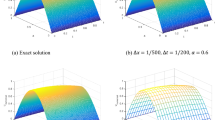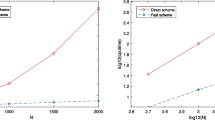Abstract
A high-order Crank-Nicolson-type compact difference method is proposed for a class of time fractional Cattaneo convection-diffusion equations with smooth solutions. The convection coefficient of the equation may be spatially variable. A suitable transformation is adopted to transform the original equation into a reaction-diffusion equation, which is then discretized by a fourth-order compact difference approximation for the spatial derivative and by a second-order Crank-Nicolson-type difference approximation for the time first derivative and the Caputo time fractional derivative. The local truncation error and the solvability of the resulting scheme are discussed in detail. The (almost) unconditional stability of the method and its convergence of second order in time and fourth order in space are rigorously proved using a discrete energy analysis method. A Richardson extrapolation algorithm, including its rigorous convergence analysis, is presented. This extrapolation algorithm improves the temporal accuracy of the computed solution to the third order. An application of the proposed method to the non-smooth solution which has a weak singularity at the initial time is also discussed by introducing a correction term. Numerical results demonstrate the accuracy of the new method and the high efficiency of the Richardson extrapolation algorithm.
Similar content being viewed by others
References
Alikhanov, A.A.: A new difference scheme for the time fractional diffusion equation. J. Comput. Phys. 280, 424–438 (2015)
Brunner, H., Ling, L., Yamamoto, M.: Numerical simulations of 2D fractional subdiffusion problems. J. Comput. Phys. 229, 6613–6622 (2010)
Cao, J.Y., Xu, C.J.: A high order schema for the numerical solution of the fractional ordinary differential equations. J. Comput. Phys. 238, 154–168 (2013)
Chen, J., Liu, F., Anh, V., Shen, S., Liu, Q., Liao, C.: The analytical solution and numerical solution of the fractional diffusion-wave equation with damping. Appl. Math. Comp. 219, 1737–1748 (2012)
Compte, A., Metzler, R.: The generalized Cattaneo equation for the description of anomalous transport processes. J. Phys. A: Math. Gen. 30, 7277–7289 (1997)
Das, P.: A higher order difference method for singularly perturbed parabolic partial differential equations. J. Differ. Equ. Appl. 24, 452–477 (2018)
Das, P., Mehrmann, V.: Numerical solution of singularly perturbed convection-diffusion-reaction problems with two small parameters. BIT Numer. Math. 56, 51–76 (2016)
Das, P., Natesan, S.: Richardson extrapolation method for singularly perturbed convection-diffusion problems on adaptively generated mesh. CMES: Comput. Model. Eng. Sci. 90, 463–485 (2013)
Das, P., Vigo-Aguiar, J.: Parameter uniform optimal order numerical approximation of a class of singularly perturbed system of reaction diffusion problems involving a small perturbation parameter. J. Comput. Appl. Math. https://doi.org/10.1016/j.cam.2017.11.026
Dimitrov, Y.: Numerical approximations for fractional differential equations. J. Frac. Calc. Appl. 5, 1–45 (2014)
Gao, G.H., Sun, H.W., Sun, Z.Z.: Some high-order difference schemes for the distributed-order differential equations. J. Comput. Phys. 298, 337–359 (2015)
Gao, G.H., Sun, Z.Z., Zhang, H.W.: A new fractional numerical differentiation formula to approximate the Caputo fractional derivative and its applications. J. Comput. Phys. 259, 33–50 (2014)
Ghazizadeh, H.R., Maerefat, M., Azimi, A.: Explicit and implicit finite difference schemes for fractional Cattaneo equation. J. Comput. Phys. 229, 7042–7057 (2010)
Godoy, S., Garcia-Colin, L.S.: From the quantum random walk to classical mesoscopic diffusion in crystalline solids. Phys. Rev. E 53, 5779–5785 (1996)
Gomez, H., Colominas, I., Navarrina, F., Casteleiro, M.: A mathematical model and a numerical model for hyperbolic mass transport in compressible flows. Heat Mass Transf. 45, 219–226 (2008)
Ji, C.C., Sun, Z.Z.: A high-order compact finite difference scheme for the fractional sub-diffusion equation. J. Sci. Comput. 64, 959–985 (2015)
Ji, C.C., Sun, Z.Z.: The high-order compact numerical algorithms for the two-dimensional fractional sub-diffusion equation. Appl. Math. Comput. 269, 775–791 (2015)
Jin, B., Lazarov, R., Pasciak, J., Zhou, Z.: Error analysis of semidiscrete finite element methods for inhomogeneous time-fractional diffusion. IMA J. Numer. Anal. 35, 561–582 (2015)
Jin, B., Lazarov, R., Zhou, Z.: An analysis of the L1 scheme for the subdiffusion equation with nonsmooth data. IMA J. Numer. Anal. 36, 197–221 (2016)
Jin, B., Lazarov, R., Zhou, Z.: Two fully discrete schemes for fractional diffusion and diffusion-wave equations with nonsmooth data. SIAM J. Sci. Comput. 38, A146–A170 (2016)
Jin, B., Li, B., Zhou, Z.: Correction of high-order BDF convolution quadrature for fractional evolution equations. SIAM J. Sci. Comput. 39, A3129–A3152 (2017)
Jin, B., Zhou, Z.: An analysis of Galerkin proper orthogonal decomposition for subdiffusion. ESAIM Math. Model. Numer. Anal. 51, 89–113 (2017)
Jou, D., Casas-Vazquez, J., Lebon, G.: Extended Irreversible Thermodynamics. Springer, Berlin (2001)
Li, C.P., Chen, A., Ye, J.J.: Numerical approaches to fractional calculus and fractional ordinary differential equation. J. Comput. Phys. 230, 3352–3368 (2011)
Li, C.P., Zeng, F.H.: Numerical Methods for Fractional Calculus. Chapman and Hall/CRC, Boca Raton (2015)
Liao, W.: A compact high-order finite difference method for unsteady convection-diffusion equation. Int. J. Comput. Methods Eng. Sci. Mech. 13, 135–145 (2012)
Liu, F., Zhuang, P., Burrage, K.: Numerical methods and analysis for a class of fractional advection-dispersion models. Comput. Math. Appl. 64, 2990–3007 (2012)
Lubich, C.: Discretized fractional calculus. SIAM J. Math. Anal. 17, 704–719 (1986)
Luchko, Y.: Initial-boundary-value problems for the one-dimensional time-fractional diffusion equation. Fract. Calc. Appl. Anal. 15, 141–160 (2012)
Miller, J.J.H., O’Riordan, E., Shishkin, G.I.: Fitted Numerical Methods for Singular Perturbation Problems. World Scientific, Singapore (1996)
Mustapha, K., Almutawa, J.: A finite difference method for an anomalous sub-diffusion equation, theory and applications. Numer. Algor. 61, 525–543 (2012)
Povstenko, Y.Z.: Fractional Cattaneo-type equations and generalized thermoelasticity. J. Therm. Stresses 34, 97–114 (2011)
Qi, H., Jiang, X.: Solutions of the space-time fractional Cattaneo diffusion equation. Phys. A 390, 1876–1883 (2011)
Quarteroni, A., Valli, A.: Numerical Approximation of Partial Differential Equations. Springer, New York (1997)
Ren, J.C., Gao, G.H.: Efficient and stable numerical methods for the two-dimensional fractional Cattaneo equation. Numer. Algor. 69, 795–818 (2015)
Sakamoto, K., Yamamoto, M.: Initial value/boundary value problems for fractional diffusion-wave equations and applications to some inverse problems. J. Math. Anal. Appl. 382, 426–447 (2011)
Samarskii, A.A.: The Theory of Difference Schemes. Marcel Dekker Inc., New York (2001)
Stynes, M., O’Riordan, E., Luis Gracia, J.L.: Error analysis of a finite difference method on graded meshes for a time-fractional diffusion equation. SIAM J. Numer. Anal. 55, 1057–1079 (2017)
Sun, H., Sun, Z.Z., Gao, G.H.: Some temporal second order difference schemes for fractional wave equations. Numer. Methods Partial Differ. Equ. 32, 970–1001 (2016)
Tian, W.Y., Zhou, H., Deng, W.H.: A class of second order difference approximations for solving space fractional diffusion equations. Math. Comput. 84, 1703–1727 (2015)
Varga, R.S.: Matrix Iterative Analysis. Springer, Berlin (2000)
Vong, S.W., Pang, H.K., Jin, X.Q.: A high-order difference scheme for the generalized Cattaneo equation. East Asian J. Appl. Math. 2, 170–184 (2012)
Vong, S., Wang, Z.: High order difference schemes for a time-fractional differential equation with Neumann boundary conditions. East Asian J. Appl. Math. 4, 222–241 (2014)
Wang, Y.-M.: A compact finite difference method for a class of time fractional convection-diffusion-wave equations with variable coefficients. Numer. Algor. 70, 625–651 (2015)
Wang, Y.-M.: A high-order compact finite difference method and its extrapolation for fractional mobile/immobile convection-diffusion equations. Calcolo 54, 733–768 (2017)
Wang, Z., Vong, S.: Compact difference schemes for the modified anomalous fractional sub-diffusion equation and the fractional diffusion-wave equation. J. Comput. Phys. 277, 1–15 (2014)
Zakari, M., Jou, D.: Equations of state and transport equations in viscous cosmological models. Phys. Rev. D 48, 1597–1601 (1993)
Zeng, F., Li, C., Liu, F., Turner, I.: Numerical algorithms for time-fractional subdiffusion equation with second-order accuracy. SIAM J. Sci. Comput. 37, A55–A78 (2015)
Zhai, S.Y., Feng, X.L., He, Y.N.: An unconditionally stable compact ADI method for three-dimensional time-fractional convection-diffusion equation. J. Comput. Phys. 269, 138–155 (2014)
Zhang, Y., Benson, D.A., Reeves, D.W.: Time and space nonlocalities underlying fractional-derivative models: distinction and literature review of field applications. Adv. Water Resour. 32, 561–581 (2009)
Zhang, Y.N., Sun, Z.Z., Wu, H.W.: Error estimates of Crank-Nicolson-type difference schemes for the subdiffusion equation. SIAM J. Numer. Anal. 49, 2302–2322 (2011)
Zhao, L.J., Deng, W.H.: A series of high order quasi-compact schemes for space fractional diffusion equations based on the superconvergent approximations for fractional derivatives. Numer. Methods Partial Differ. Equ. 31, 1345–1381 (2015)
Zhao, X., Sun, Z.Z.: Compact Crank-Nicolson schemes for a class of fractional Cattaneo equation in inhomogeneous medium. J. Sci. Comput. 62, 747–771 (2015)
Zhou, H., Tian, W.Y., Deng, W.H.: Quasi-compact finite difference schemes for space fractional diffusion equations. J. Sci. Comput. 56, 45–66 (2013)
Zorich, V.A.: Mathematical Analysis II. Springer, Berlin (2004)
Acknowledgements
The author would like to thank the referees for their valuable comments and suggestions which improved the presentation of the paper.
Author information
Authors and Affiliations
Corresponding author
Additional information
This work was supported in part by Science and Technology Commission of Shanghai Municipality (STCSM) (No. 18dz2271000).
Appendices
Appendix A
A.1 Proof of Proposition 2.1
Proof
Since y(t) ∈ Cr[0,T], its extension yex(t) is r-times continuously differentiable at \(t\in \mathbb {R} \setminus \{0\}\) and has one-sided derivatives of order up to r at t = 0. This implies yex(t) ∈ Cr[0,∞). Moreover, for each k = 0, 1,…,r, \({y}_{\text {ex}}^{(k)}(t)\) is absolutely integrable on \(\mathbb {R}\) (define, e.g., \({y}_{\text {ex}}^{(k)}(0) = y^{(k)}(0)\)) and thus its Fourier transformation \({\mathcal {F}} \left [{y}_{\text {ex}}^{(k)}\right ](\omega )\) is defined.
Assume, by contradiction, that there exists 0 ≤ r′≤ r − 1 such that y(k)(0) = 0 for k = 0, 1,…,r′− 1 but \(y^{(r^{\prime })}(0)\not = 0\). By integrating by parts,
By the Riemann-Lebesgue lemma (see [55]), \({\lim _{|\omega |\rightarrow \infty }} {\mathcal {F}} \left [{y}_{\text {ex}}^{(r^{\prime }+ 1)}\right ] (\omega )= 0\). We therefore obtain from (A.1) that \(\lim _{|\omega |\rightarrow \infty }(-\mathrm {i}\omega )^{r^{\prime }+ 1} \hat {y}_{\text {ex}}(\omega )= y^{(r^{\prime })}(0)\not = 0\). This implies
Since r′ + 1 − r0 − β < 1, we get that the function \(|\omega |^{r_{0}+\beta } |\hat {y}_{\text {ex}}(\omega )|\) is not integrable on \(\mathbb {R}\). This contradicts \(y_{\text {ex}}(t) \in \mathscr{C}^{r_{0}+\beta } (\mathbb {R})\). This proves that y(k)(0) = 0 for k = 0, 1,…,r − 1. □
A.2 Proof of Proposition 4.1
Proof
For each k = 2, 3, 4, we define
Case 1: k = 2. Differentiating the governing equation in (??) with respect to t, we obtain
By integrating by parts and differentiating with respect to t,
We thus have from (A.3) that
The continuation property of w2(x,t) and α ∈ (1, 2) imply \({\lim _{t\rightarrow 0}} w_{2}(x,t)t^{\alpha -1}= 0\). This proves that the limit \({\lim _{t\rightarrow 0}} F_{2}(x,t)\) exists and (??) holds true for k = 2.
Case 2: k = 3. Differentiating the (A.3) and (A.4) with respect to t gives
This shows
Letting t → 0 in (A.8), we get (??) for k = 3.
Case 3: k = 4. Differentiating the (A.6) and (A.7) with respect to t and solving for \(\frac {\partial ^{4} u}{\partial t^{4}}(x,0)\), we obtain
Then, (??) for k = 4 follows by letting t → 0 in the above equality. □
Rights and permissions
About this article
Cite this article
Wang, YM. A Crank-Nicolson-type compact difference method and its extrapolation for time fractional Cattaneo convection-diffusion equations with smooth solutions. Numer Algor 81, 489–527 (2019). https://doi.org/10.1007/s11075-018-0558-3
Received:
Accepted:
Published:
Issue Date:
DOI: https://doi.org/10.1007/s11075-018-0558-3
Keywords
- Fractional Cattaneo convection-diffusion equation
- Compact difference method
- Shifted Grünwald formula
- Stability and convergence
- Richardson extrapolation




